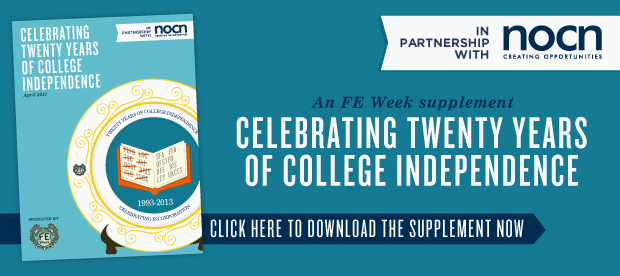Leeds City College is one of the single largest providers of apprenticeships in the UK following the launch of the Apprenticeship Training Agency — jointly owned with the local authority — and the creation of the Food Academy at city centre restaurant Flannels.
Now the third largest college in the UK with more than 40,000 students, 1,500 staff and an annual turnover of £90m, it is a far cry from 1993 and incorporation when the then small Kitson College was rebranded Leeds College of Technology.
Since then, one factor more than almost any other has contributed to the changing size and scope of FE — that’s merger.
While the Coalition government may be sceptical of the rush to merge, as have all previous administrations at times, the merger bandwagon has rolled on over 20 years with the creation of giants such as Newcastle College Group, Bedford and New College Nottingham. The litany of colleges absorbed into Leeds City includes Park Lane, Airedale, Wharfedale, Keighley, Thomas Danby, Joseph Priestley and Leeds College of Music (which retains its name as a wholly-owned subsidiary).
But what has changed beyond the size? On one level, less than you might think, according to Peter Roberts, (pictured) the principal since 2009 and chair of the 157 group.
“Skills I need for the job of chief executive have changed,” he says.
“Curriculum and quality used to be my strengths, but now I’m expected to be a politician, have networks, be around 24/7 and definitely not disappear for four or five weeks’ holiday.”
He still draws greatest strength from his curriculum roots.
“When I do my weekly blog and can write ‘I remember when I was a teacher…’ I know that adds to my credibility,” says Roberts.
And with ultimate responsibility for diverse operations from estates management and customer services to complex MIS and dealing with every level from pre-entry level students to HE for foundation degrees, now at record levels, “I need to be able to manage teams of people with skills I don’t have.”
What has not changed, Roberts insists, is the fundamental curriculum ideas and chances FE offers.
“At one time we were a tertiary college offering shipbuilding apprenticeships and flour milling. Now even the face of motor mechanics has changed and we offer advanced manufacturing and technology skills,” he says.
“But it’s still what it always was — a relevant curriculum.
“FE is, or should be, what it has always been at its best — bespoke tailoring of vocational education to suit individual needs.” But that tailoring — possible, he says, because of the economies of scale size brings — is bringing something new.
Work-based programmes, online learning and, recently, incubation start-up units helped create 300 new micro-businesses and 700 jobs in Leeds last year.
Work with business is a key area with Leeds City College having established links with more than 2,500 public, private and third sector companies from small and medium-sized enterprises to major household names including Arriva, First, Debenhams, IKEA, Lloyds TSB and BAe Systems.
Roberts warns, however, against FE losing sight of its other fundamental purposes.
With the disappearance of unskilled and semi-skilled work, “we are seeing more and more people with disadvantaged backgrounds, NEETs are rising and there’s more work to be done with Job centres,” he says.
“If colleges like us did not do the work, it’s difficult to know who would pick it up.”
So, despite the austerity we now face, he pleads with FE leaders not to lose sight of the basics, the LLDD learners, the mother returning to learn by doing flower arranging and finding a new career path and the young disaffected person in danger of becoming a NEET by being forced down an inappropriate route.
“For example, in Leeds, healthcare and digital technology are the big thing. But if I tell young people who want to be hairdressers this is what they must do, they will quit and become NEETs,” explains Roberts.
“We need to have time and patience to guide people appropriately. This is what FE at its best has always been good at.”


Your thoughts